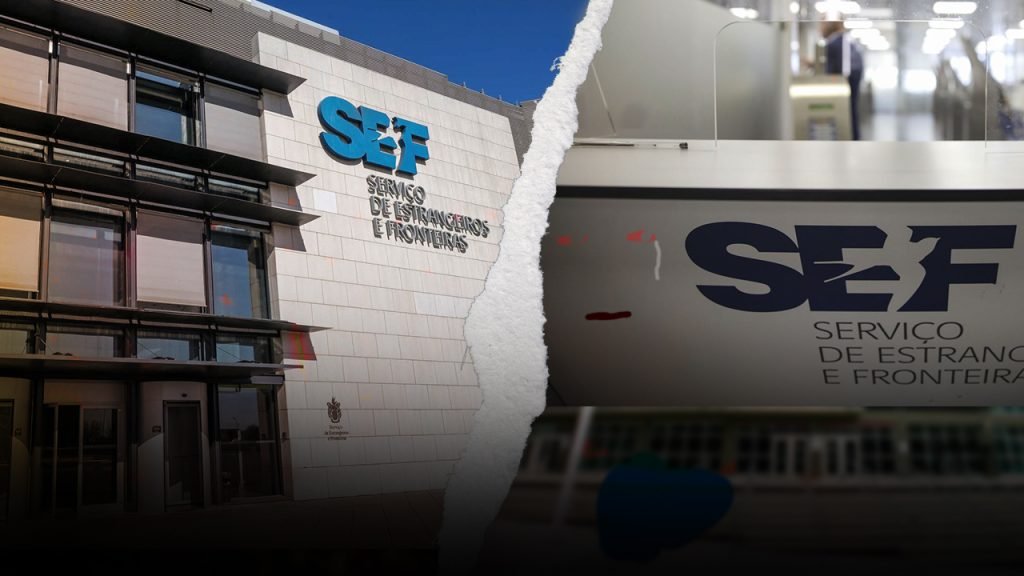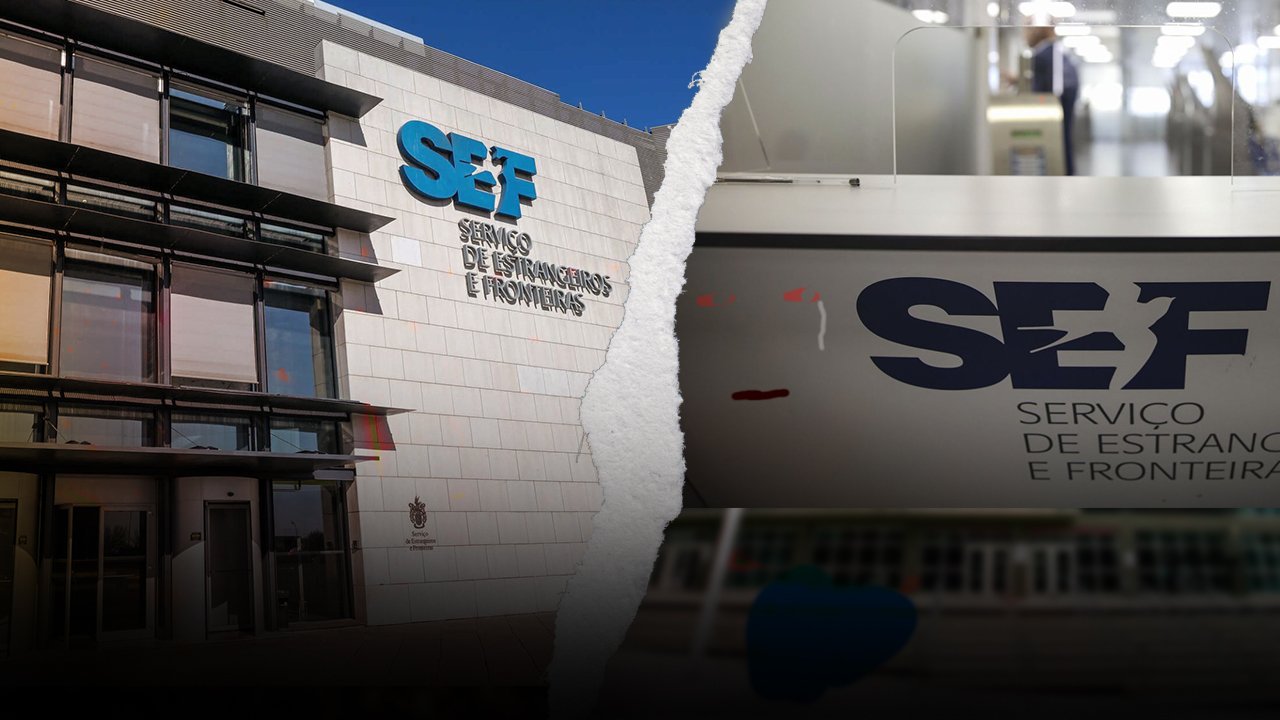The SEF has concluded its operations, and the Agency for Integration, Migrations, and Asylum has taken over its role in issuing documents for foreigners in administrative matters.
The powers of the Foreigners and Borders Service (SEF) have been transferred to seven bodies, with police officers passing to the PSP, GNR and PJ, while administrative functions related to foreign citizens will go to the new agency and Institute of Registration and Notary Office (IRN), with the Borders and Foreigners Coordination Unit also being created, which will operate under the authority of the secretary general of the Internal Security System, in addition to some inspectors also being transferred to the Tax Authority.
Here are some questions and answers about the end of SEF and the transition of skills.

When was the decision made to shut down SEF?
documentation was initially outlined in the program of the previous PS Government. However, it gained momentum after a Ukrainian citizen’s tragic death at the SEF facilities in Lisbon Airport, when the former Minister of Internal Administration, Eduardo Cabrita, announced plans to restructure the service.
The Assembly of the Republic officially approved the discontinuation of SEF on October 22, 2021.
In November of the same year, Parliament voted to postpone the closure of SEF until May 2022 in response to a bill introduced by the PS, citing the impact of the Covid-19 pandemic.
Subsequently, in late April 2022, the current Government delayed the termination of the Foreigners and Borders Service for the second time. This postponement was in effect until the establishment of the Portuguese Agency for Migration and Asylum (APMA), which was later renamed the Agency for Integration, Migration, and Asylum (AIMA).
When did the government approve the present reform?
On April 6th of this year, the Government approved the creation of the Portuguese Agency for Minorities, Migrations and Asylum and the transition regime for workers in the Foreigners and Borders Service.
On May 24, the President of the Republic promulgated the Government’s diplomas, foreseeing difficulties in the initial phase of the new agency, taking into account the pending residence permit processes.
Where will SEF employees be relocated?
Non-police employees will be reassigned to the Agency for Integration, Migration, and Asylum, as well as the Institute of Registration and Notary.
Inspectors, on the other hand, will be transferred to the Judiciary Police, with a temporary placement option at the PSP and GNR. Some inspectors may also have the opportunity to move to the Tax Authority, AIMA, and the Borders and Foreigners Coordination Unit.
How many inspectors will be transferred to the Judiciary Police (PJ)?
The Judiciary Police (PJ) will initially receive 390 inspectors. As per the Ministry of Internal Administration (MAI), 789 officers from the inspection and supervision career, and five from the surveillance and security career, are being transferred to the PJ.
Out of these 789 inspectors relocated to the PJ, 404 will be “temporarily assigned to the security forces,” with 324 going to the PSP and 80 to the GNR. This temporary assignment can extend for a period of up to two years.
How many inspectors go to the Borders and Foreigners Coordination Unit, AIMA and Tax Authority (AT)?
To date, it is unknown how many there are, with MAI claiming that the number of elements to be placed in these institutions will be defined “at a later stage”.
What will the Public Security Police (PSP) be tasked with?
The Public Security Police (PSP) will be responsible for monitoring, inspecting, and overseeing airport borders. They will also manage temporary installation centers at airports.
Within PSP, they have established the Organic Airport Security and Border Control Unit, which will be in charge of supervising the arrival and departure of individuals through air travel and maintaining security at airports.
As of now, PSP has 400 police officers trained in border control and 62 air escorts.
What will the National Republican Guard (GNR) be tasked with?
The National Republican Guard (GNR) will be responsible for monitoring, inspecting, and controlling maritime and land borders, which also includes overseeing cruise terminals. To fulfill these functions, the existing GNR Coastal Control Unit will be renamed the GNR Coastal and Border Control Unit.
Currently, the GNR has 235 trained officers for these border control duties.
What skills and responsibilities are being transferred to the Judiciary Police (PJ)?
The Judiciary Police (PJ) will be responsible for handling investigations related to illegal immigration and human trafficking.
What is the structure or organization of the Borders and Foreigners Coordination Unit?
The Borders and Foreigners Coordination Unit, often referred to as “mini-SEF,” will function under the authority of the secretary general of the Internal Security System, Paulo Vizeu Pinheiro. Its primary role will be to coordinate activities among various police entities, fostering collaboration between these forces, the Institute of Registration and Notary (IRN), and the Agency for Integration, Migration, and Asylum (AIMA). This coordination is crucial for managing the movement of people, ensuring their return, and controlling border-related matters.
The unit, led by a general coordinator (whose name is not yet disclosed), will also oversee the management of police databases and information systems concerning borders, foreigners, and international police cooperation.
What is AIMA?
The Agency for Integration, Migration, and Asylum (AIMA) will take over the roles previously held by SEF and the High Commission for Migrations, the latter being abolished.
AIMA will handle administrative tasks related to foreign citizens in Portugal, such as issuing residence permits and assisting refugees.
The High Commission for Migration will focus on the reception and integration of immigrants in Portugal.
AIMA will also inherit approximately 300,000 pending immigrant legalization processes from SEF.
A total of 590 workers from SEF’s general and IT careers will be transferred to AIMA, while the ACM has around 190 employees.
This transfer of responsibilities occurs at a time when over a million immigrants reside in Portugal.
What will the Institute of Registration and Notary (IRN) be responsible for?
The Institute of Registration and Notary (IRN) will be responsible for the issuance of Portuguese electronic passports and the renewal of residence permits. Additionally, 75 non-police employees from SEF will be transferred to IRN to assist in these tasks.
What will be the fate of the SEF facilities?
The SEF facilities that exist in the country will be transferred to the services that assume their responsibilities, but so far the fate of the building where the SEF headquarters is located, in Porto Salvo (municipality of Oeiras, district of Lisbon) is still unknown.





